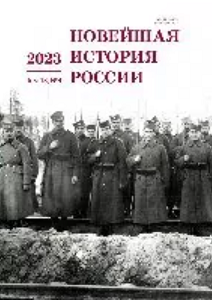Постигая смысл блокады: новые методы изучения блокадной повседневности
Understanding the Meaning of the Blockade: New Methods for Studying Blockade Everyday Life
Author(s): Nikita Andreevich LomaginSubject(s): Military history, Political history, WW II and following years (1940 - 1949), History of Communism, Book-Review
Published by: Издательство Исторического факультета СПбГУ
Keywords: Blockade; Great Patriotic War; USSR; Leningrad; Stalin;
Summary/Abstract: The book by Jeffrey Hass Wartime Suffering and Survival is the result of his many years of work in the archives of St. Petersburg in order to comprehend the phenomenon of the blockade of Leningrad as one of the largest humanitarian tragedies of the twentieth century. Such a broad view of the history of the blockade is highly expected from a sociologist who offered his own view of Bolshevism as a civilization during the war. The book by J.Hass contains a lot of hidden and open polemics about the essence of Stalinism (the author prefers to talk about Bolshevism), about the war and the blockade with major American and Russian historians, including M.Foucault’s student S.Kotkin, as well as W.Goldman, A. Perry and S.V.Yarov. Knowing perfectly the historiography of the blockade and being the permanent organizer of discussions on the history of the blockade at the annual conferences of the Association for Slavic, East European, and Eurasian Studies for almost twenty years, J.Hass invariably raises major questions that allow one to see not only the special, but also the general, characteristic of developed societies caught in an emergency situation for such a long time. Based on diaries, memoirs, interviews, law enforcement reports and other official sources, this book tells about the life of ordinary Leningrad ers in conditions of war, famine and extreme uncertainty. Relations between people and the reduction of social distance become especially important in conditions when the state and its institutions begin to falter. The opportunistic behavior of some (including corruption in the trading system and crime), as well as the growing sense of hopelessness in the autumn of 1941 and in the hardest months of the first blockade winter, were balanced to some extent by mutual assistance and simple human relations of the majority of the townspeople.
Journal: Новейшая история России
- Issue Year: 13/2023
- Issue No: 45
- Page Range: 833-839
- Page Count: 7
- Language: Russian

